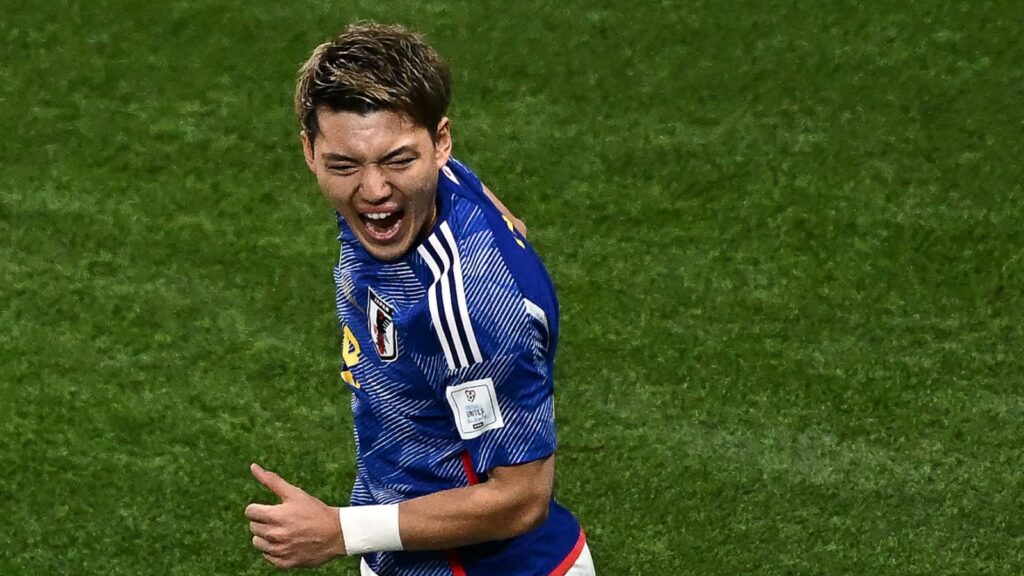Germany Undone by Japan’s Bundesliga Brigade
Hajime Moriyasu, Japan’s under-rated coach, made some excellent substitutions, and it was Japan’s German contingent that stuck a knife through the perennial favourite’s heart.
“Never bite the hand that feeds you” goes the old saying. Well, Japan’s footballers didn’t just bite it, they swallowed it whole. Once the dust settles on this most incredible of World Cup upsets – remember that Germany are football royalty second only to Brazil – millions of disconsolate German fans will look at the identity of their conquerors and allow themselves a rueful smile.
Ritsu Doan, who scored the equaliser, converting the rebound after Manuel Neuer had saved Takumi Minamino’s cross-shot, plays for high-flying SC Freiburg in the Bundesliga. And the winner, after delightful cushioned control of a long ball and a bullet finish past Neuer at his near post, came from Takuma Asano of VFL Bochum. Before the game, Germany would have identified Eintracht Frankfurt’s Daichi Kamada, with seven league goals this season, as the likely danger man, but it was two substitutes that did the damage after a second half that saw wave after wave of Blue Samurai attacks.
The substitutions. How crucial were they? The goalscorers and Minimano had all been introduced with Japan chasing the game, refusing to settle for an honourable defeat as they might have a generation earlier. Hajime Moriyasu doesn’t have the international coaching pedigree of Herve Renard, but his wards have undoubtedly upstaged Saudi Arabia by taking down Germany, who have missed the quarterfinals just once since 1950.
In fact, a lot of the previews before the tournament mentioned Moriyasu’s lack of coaching chops. But what the one-time midfielder who was capped 35 times by his country proved is that you don’t need a big reputation to get your players to follow your instructions to the letter.
Japan weren’t bad in the first half, but they were guilty of uncharacteristic sloppiness. On one occasion, Junya Ito broke down the right, and sent in the perfect pass. Had Daizen Maeda, who plays for Celtic in Scotland, timed his run properly, he would have had the simplest of tap-ins. And he did put the ball in the net, but only after being more than a yard offside. It was the kind of mistake you simply can’t afford against teams like Germany, on a stage like this.
Moriyasu deserves huge credit for making the changes when he did. One of those he took off was the modern-day poster boy of Japanese football – Takefusa Kubo. Now with Real Sociedad in the Basque country, Kubo trained four years as a boy with Barcelona, before transferring to Real Madrid when he was 18. His three years there were spent on loan at Mallorca, Villarreal and Getafe, but just being associated with Spain’s big two has given him lofty status back home.

Minamino, of course, was integral to Liverpool’s two Cup wins last season, and though he hasn’t set the French league alight with Monaco after moving on in the summer, his composure and eye for goal are highly prized in Japan.
Japanese football has enjoyed the spotlight before. In their home World Cup in 2002, the Hidetoshi Nakata generation beat Russia and drew with Belgium. In South Africa in 2010, inspired by the brilliant Keisuke Honda, they thumped Denmark 3-1. And their last campaign featured a noteworthy 2-1 win over Colombia before Belgium broke their hearts in the round of 16 with three goals in the last quarter after Japan had led 2-0 early in the second half.
This, though, puts all of that in the shade. This is Germany, albeit a less mighty avatar without the midfield control once offered by Toni Kroos and the boundless energy that was the calling card of Bastian Schweinsteiger. But make no mistake, this is a seriously talented German side.
Jamal Musiala is one of the most exciting players of his generation, while the Cameroon-born Youssoufa Moukoko just turned 18. Kai Havertz has already won a Champions League with Chelsea, while Ilkay Gundogan is Manchester City royalty. Neuer has been name-checked in any discussion on the world’s best goalkeepers for over a decade.
BREAKING:
Jubilant #JPN fans after their team’s victory against #GER@iabhijitdesh @BoriaMajumdar #Qatar2022 #FIFAWorldCup pic.twitter.com/twLJkvywCX— RevSportz (@RevSportz) November 23, 2022
Hansi Flick, their coach, won the Champions League with Bayern Munich, annihilating Lionel Messi’s Barcelona along the way. Whatever the post-match narrative may be, this wasn’t a result anyone expected. Except maybe the Japanese, who came out for the second half and played Germany off the park.
This World Cup started disastrously for Asia, with Qatar so listless in the opening game, and Iran put to the sword by a rampant England. But Saudi Arabia and Japan have shown on successive days that football’s roots have grown deep and strong on the biggest continent. Maybe, just maybe, after years of watching on in envy, this is Asia’s time.





